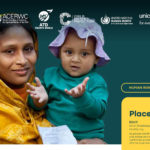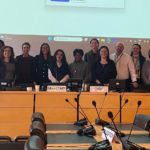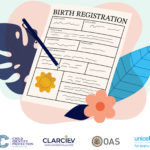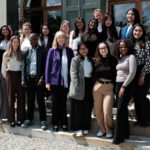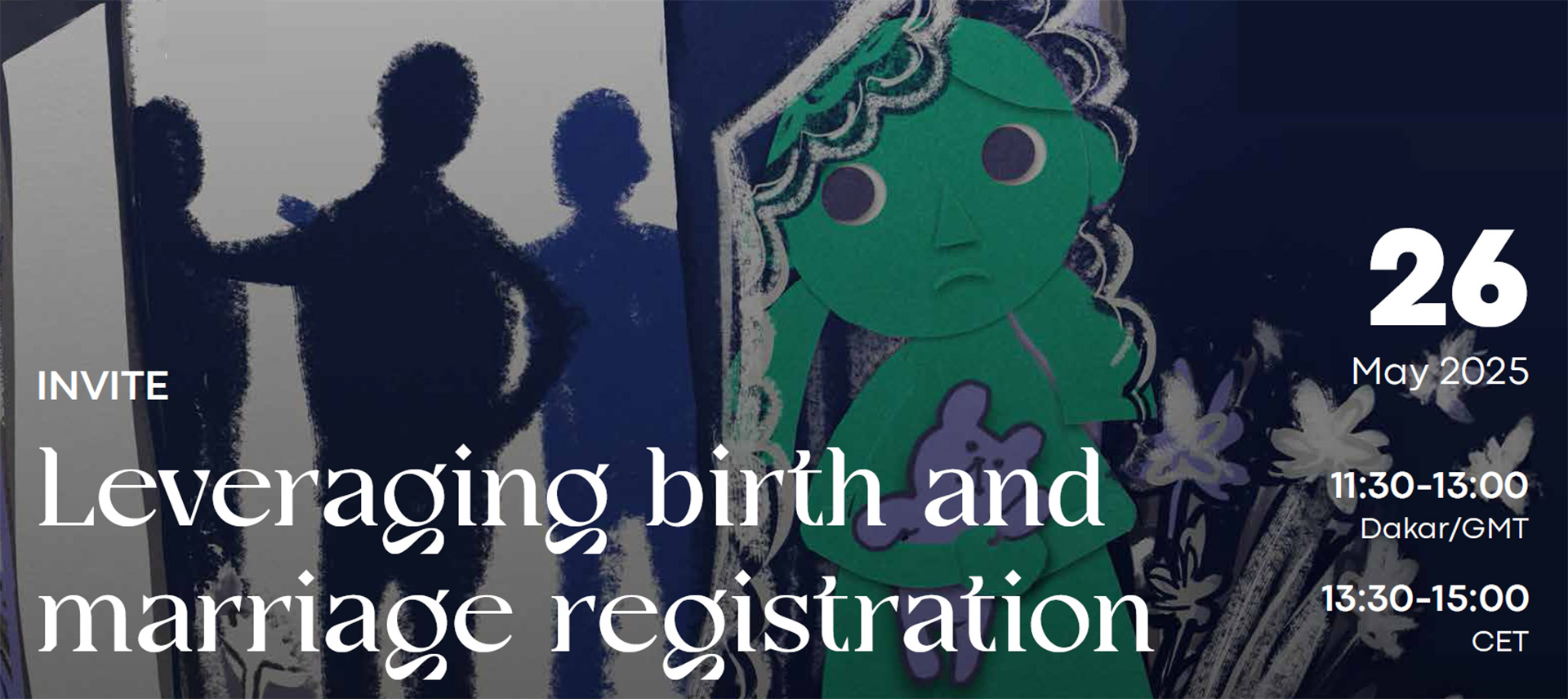
Webinar: Leveraging birth and marriage registration to prevent child marriage in 11 countries in West and Central Africa
RECORDING
OVERVIEW
When: 26 May 2025, 11:30-13:00 Dakar/GMT | 13:30-15:00 CET
Where: online by registering at https://us02web.zoom.us/webinar/register/WN_uP6hXfgzTRek5zxpkQBXkg#/
Who:
- Ann SKELTON, CRC Committee Chairperson (2023-2025) and Professor, University of Pretoria and Leiden
- Mr Aristide ADJINACOU, Director General of the Agency responsible for identifying individuals (l’Agence en charge de l’identification des personnes (ANIP)), reporting to the Presidency of the Republic of Benin.
- Mr Brahim ALI SEID, Head of Civil Status and Cooperation at the National Agency for Secure Documents (l’Agence Nationale des Titres Sécurisés (ANATS)), Government of Chad.
- Mr Joseph Sunday SINNAH, Chief Director of the Ministry of Gender and Children’s Affairs, Government of Sierra Leone
- Karin HEISSLER, Regional Advisor Child Protection, UNICEF WCARO
Interpretation in English and French
What: Based on findings from a desk review of laws in 11 countries in West and Central Africa, join us to explore how existing birth and marriage registration legislative frameworks can potentially contribute to preventing child marriage. The interactions between these frameworks are specifically examined in Benin, Burkina Faso, Chad, Central African Republic, Democratic Republic of Congo, Guinea, Mali, Mauritania, Niger, Senegal and Sierra Leone.
Having a requirement of proof of age prior to celebrating and/or registering a marriage, reinforces the importance of a lifecycle approach to civil registration. Where the couple is required to provide legal proof of age, it is the civil registration office’s responsibility to verify age using existing records. When individual events are handled separately, the registration system fails to benefit from its very strength. The State should be able to verify the age of the child through its own records.
Objective: During the webinar, we will hear from Senior Government officials about their countries’ legal frameworks and its enforcement, and will discuss the operational realities, barriers, how they are being addressed and lessons learned to enforce the legal age of marriage as a means to prevent child marriage.
Quand : 26 mai 2025, 11 h 30-13 h 00 Dakar/GMT | 13 h 30-15 h 00 CET
Où : en ligne, sur inscription à l’adresse https://us02web.zoom.us/webinar/register/WN_uP6hXfgzTRek5zxpkQBXkg#/
Qui :
- Ann SKELTON, CRC Committee Chairperson (2023-2025) and Professor, University of Pretoria and Leiden
- Mr Aristide ADJINACOU, Director General of the Agency responsible for identifying individuals (l’Agence en charge de l’identification des personnes (ANIP)), reporting to the Presidency of the Republic of Benin.
- Mr Brahim ALI SEID, Head of Civil Status and Cooperation at the National Agency for Secure Documents (l’Agence Nationale des Titres Sécurisés (ANATS)), Government of Chad.
- Mr Joseph Sunday SINNAH, Chief Director of the Ministry of Gender and Children’s Affairs, Government of Sierra Leone
- Karin HEISSLER, Regional Advisor Child Protection, UNICEF WCARO
Interprétation en anglais et en français
Thème : Sur la base des conclusions d’une étude documentaire des lois de 11 pays d’Afrique de l’Ouest et d’Afrique centrale, rejoignez-nous pour explorer comment les cadres législatifs existants en matière d’enregistrement des naissances et des mariages peuvent contribuer à prévenir les mariages précoces. Les interactions entre ces cadres sont examinées en particulier au Bénin, au Burkina Faso, au Tchad, en République centrafricaine, en République démocratique du Congo, en Guinée, au Mali, en Mauritanie, au Niger, au Sénégal et en Sierra Leone.
L’obligation de prouver son âge avant de célébrer et/ou d’enregistrer un mariage renforce l’importance d’une approche du registre civil fondée sur le cycle de vie. Lorsque le couple est tenu de fournir une preuve légale de son âge, il incombe au bureau d’état civil de vérifier l’âge à l’aide des registres existants. Lorsque les événements individuels sont traités séparément, le système d’enregistrement ne tire pas parti de ses atouts. L’État devrait être en mesure de vérifier l’âge de l’enfant à partir de ses propres registres.
Objectif : Au cours du webinaire, nous entendrons des hauts fonctionnaires présenter le cadre juridique de leur pays et son application, et nous discuterons des réalités opérationnelles, des obstacles, des mesures prises pour les surmonter et des enseignements tirés pour faire respecter l’âge légal du mariage afin de prévenir le mariage des enfants.
Cuándo: 26 de mayo de 2025, 11:30-13:00 Dakar/GMT | 13:30-15:00 CET
Dónde: En línea, registrándose en: https://us02web.zoom.us/webinar/register/WN_uP6hXfgzTRek5zxpkQBXkg#/
Quién:
- Ann SKELTON, CRC Committee Chairperson (2023-2025) and Professor, University of Pretoria and Leiden
- Mr Aristide ADJINACOU, Director General of the Agency responsible for identifying individuals (l’Agence en charge de l’identification des personnes (ANIP)), reporting to the Presidency of the Republic of Benin.
- Mr Brahim ALI SEID, Head of Civil Status and Cooperation at the National Agency for Secure Documents (l’Agence Nationale des Titres Sécurisés (ANATS)), Government of Chad.
- Mr Joseph Sunday SINNAH, Chief Director of the Ministry of Gender and Children’s Affairs, Government of Sierra Leone
- Karin HEISSLER, Regional Advisor Child Protection, UNICEF WCARO
Interpretación en inglés y francés
Qué: A partir de los resultados de un estudio documental de la legislación de 11 países de África Occidental y Central, súmase a este evento para explorar cómo los marcos legislativos existentes en materia de registro de nacimientos y de matrimonios pueden contribuir a prevenir el matrimonio infantil. Se examinarán específicamente las interacciones entre estos marcos en Benín, Burkina Faso, Chad, Guinea, Malí, Mauritania, Níger, República Centroafricana, República Democrática del Congo, Senegal y Sierra Leona.
El requisito de acreditar la edad antes de celebrar y/o registrar un matrimonio refuerza la importancia de un enfoque del registro civil basado en el ciclo de vida. Cuando se exige a la pareja que presente una prueba legal de su edad, es responsabilidad de la oficina del registro civil verificar la edad utilizando los registros existentes. Cuando los acontecimientos individuales se tratan por separado, el sistema de registro no aprovecha sus propias ventajas. El Estado debería poder verificar la edad del niño o de la niña a través de sus propios registros.
Objetivo: Durante el seminario web, escucharemos a altos funcionarios gubernamentales hablar sobre los marcos jurídicos de sus países y su aplicación, y debatiremos las realidades operativas, los obstáculos, cómo se están abordando y las lecciones aprendidas para hacer cumplir la edad legal para contraer matrimonio como medio para prevenir el matrimonio infantil.
SPEAKERS
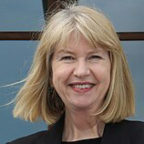
Ann Skelton
CRC Committee Chairperson (2023-2025) and Professor, University of Pretoria and Leiden
Ann Skelton is an international expert on children’s rights. She is a Law Professor at the University of Pretoria, where she holds the UNESCO Chair in Education Law, and is also appointed part time at the University of Leiden where she holds the Chair in Children’s Rights in a Sustainable World. She also teaches international children’s rights at the Universities of Oxford and Strathclyde. She has worked as a children’s rights lawyer in South Africa for 30 years where she played a leading role in child law reform. She pioneered strategic litigation on children’s rights from the Centre for Child Law (where she was Director from 2008 to 2018) and appeared as legal counsel arguing many landmark cases in the South African courts, including cases enforcing the right to education. Her global influence has been recognised through several awards, including the Honorary Worlds Children’s Prize and the Juvenile Justice Without Borders Award. She has chaired several international drafting bodies, including the Global Study on Children Deprived of their Liberty, and the expert committee that drafted the Abidjan Principles on state’s obligations regarding public education and the regulation of private of education.

Aristide Adjinacou
Director General of the Agency responsible for identifying individuals (l’Agence en charge de l’identification des personnes (ANIP)), reporting to the Presidency of the Republic of Benin
Aristide Guy ADJINACOU GNAHOUI est un expert béninois en technologies numériques, actuellement Directeur Général de l’Agence Nationale d’Identification des Personnes (ANIP) depuis sa nomination en juillet 2024.
Parcours académique et professionnel
Titulaire d’une double formation d’Ingénieur (Institut Supérieur de l’Électronique et du Numérique : ISEN) et d’un MBA (‘École Supérieure des Sciences Économiques et Commerciales : ESSEC), M. Aristide a également obtenu des certifications en « Leading Digital Transformation » (HEC-Mines Paris Tech) et en « Artificial Intelligence implications for Business Strategy » (MIT).
Fort de près de vingt ans d’expérience dans les nouvelles technologies, il a dirigé la transformation digitale du groupe Europcar et la Recherche & Développement de la branche entreprise d’Alcatel-Lucent au niveau mondial, supervisant des équipes en Chine, Inde, Russie, France et États-Unis.
Engagements et réalisations
Fort de son brillant passage à l’Agence des Systèmes d’Information et du Numérique (ASIN) en tant que Directeur du Pôle Système d’Information et Digitalisation, où il a piloté avec succès la transformation digitale de l’administration publique béninoise, son leadership et son innovation ont été reconnus lors de la première édition des African CIO Awards. Il y a été récompensé dans la catégorie « Innovation » pour le développement du GPT-BJ, un assistant conversationnel basé sur l’IA générative, qui facilite de manière significative l’accès à la réglementation béninoise pour les citoyens et les acteurs économiques.
Vision pour l’ANIP
Sous sa direction, l’ANIP a amorcé une transformation du système d’identification et de l’état civil. Cette transformation ambitieuse, axée sur l’optimisation des procédures d’identification des personnes et l’amélioration significative de l’accès aux services pour les citoyens, se concrétise déjà par le déploiement de la plateforme en ligne e-services.anip.bj et le lancement de l’application mobile ANIP BJ, facilitant les demandes d’actes d’état civil. La portée de cette initiative a été présentée lors du Sommet mondial du numérique 2025 à Washington, où il a été rappelé que l’ambition est de faire du Bénin à l’horizon 2028, la référence africaine en matière d’identification des personnes et d’état civil, en mettant en exergue des piliers essentiels tels que la fiabilité des données, l’accessibilité universelle des services et l’intégration de l’innovation technologique.
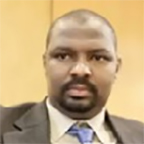
Brahim Ali Seid
Head of Civil Status and Cooperation at the National Agency for Secure Documents (l’Agence Nationale des Titres Sécurisés (ANATS)), Government of Chad
Diplômes obtenus :
- 2011 : MASTER en Management option Administration à l’Institut Supérieur de Gestion et de Planification (ISGP) Alger (Algérie) ;
- 2009 : LICENCE en Informatique de Gestion à l’Université d’Alger (Algérie) ;
- 2007 : BTS en Informatique de gestion à ESMAD Alger (Algérie)
- 2005 : Baccalauréat série D.
Coordonnateur de la Cellule Coopération et Etat Civil à l’Agence Nationale des Titres Sécurisés (ANATS)
Principaux accomplissements :
Le Coordonnateur de la Cellule Coopération et État Civil à l’Agence Nationale des Titres Sécurisés (ANATS) joue un rôle clé dans la gestion et la mise en œuvre des politiques et des actions liées à l’état civil et à la coopération internationale en matière de titres sécurisés. A cet effet, le Coordonnateur est chargé de :
– Organiser et coordonner les activités de la cellule, s’assurer de leur alignement avec les objectifs stratégiques de l’ANATS ;
– Assurer la communication et la collaboration entre les différentes parties prenantes (ministères, collectivités territoriales, organisations internationales) ;
– Suivi des Projets de Coopération en développant et mettant en œuvre des projets de coopération nationale et internationale liés à l’état civil ;
– Évaluer les besoins des partenaires en matière de formation, de technologies et de bonnes pratiques ;
– Gestion des Relations Internationales ;
– Établir des partenariats stratégiques avec d’autres agences, organisations gouvernementales et non gouvernementales ;
– Participer à des conférences et des forums internationaux pour promouvoir les initiatives de l’ANATS en matière d’état civil et de titres ;
– Faire des expertise Technique en prodiguant une expertise technique sur les questions liées à l’état civil et à la sécurisation des titres ;
– Suivre les évolutions législatives et réglementaires nationales et internationales dans le domaine de l’état civil.
– Concevoir et animer des programmes de formation pour le personnel de l’ANATS et des partenaires ;
– Sensibiliser le public et les acteurs concernés sur l’importance d’un état civil fiable et des titres sécurisés ;
– Mettre en place des indicateurs de performance pour évaluer l’efficacité des projets et des programmes en cours ;
– Rédiger des rapports d’activité et de résultats pour la direction de l’ANATS et les partenaires ;
– Explorer et recommander des solutions technologiques pour améliorer la gestion de l’état civil et la délivrance de titres sécurisés ;
– Collaborer avec les équipes informatiques pour le développement de systèmes d’information liés à l’état civil.
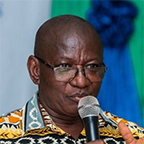
Joseph Sunday Sinnah
Chief Director of the Ministry of Gender and Children’s Affairs, Government of Sierra Leone
CHIEF DIRECTOR MINISTRY OF GENDER AND CHILDREN’S AFFAIRS
Child Protection & Social Advocacy Expert
With over 28 years of dedicated experience in child protection, social work, and gender advocacy at both national and international levels, He has risen through the ranks from officer to the highest professional level in these critical fields. His career has been characterized by leadership, technical advocacy, system strengthening, policy reform and global and policy contributor, working to protect and promote the rights of children.
Joseph has led and facilitated major advocacy initiatives, policy transformations, and legal reforms that strengthen the safeguarding of children, ensuring their fundamental rights are upheld. He supported the development of the ECOWAS regional child protection systems strengthening framework, the sexual gender based violence and sexual harassment response strategy, the enactment of the Prohibition of child Marriage Act 2024. His expertise spans social development, gender equity, and children’s rights, making him a pivotal force in shaping progressive frameworks that empower vulnerable populations.
His extensive career reflects a deep commitment to systemic change and sustainable solutions in child welfare, gender equality, and social protection. Through strategic collaboration, Joseph continues to drive impactful reforms that enhance the well-being and future of children across diverse communities.
Currently serving as member of the African Committee of Experts on the Rights and Welfare of the Child serving as Country Rapporteur of Liberia, Gabon, Benin, Chad and Cameroon, and Special Rapporteur for Child Justice.
He is a retired civil servant, extremely compassionate and knowledgeable Child Protection Social Worker with strong record in policy and legal framework, coordination and monitoring, systems strengthening.
Karin Heissler
Regional Advisor Child Protection, UNICEF WCARO

Karin Heissler is the Regional Adviser for Child Protection in the UNICEF West and Central Africa Regional Office based in Dakar, Senegal. She has worked in the field of child protection with UNICEF in Ethiopia, New York Headquarters, Liberia, Italy (Innocenti –the Office of Research), India, Pakistan and Bangladesh. Karin has also worked with NGOs and research institutions related to childhood and human rights in the United Kingdom, India and Thailand. She has a DPhil in International Development.
- 28 April 2025

